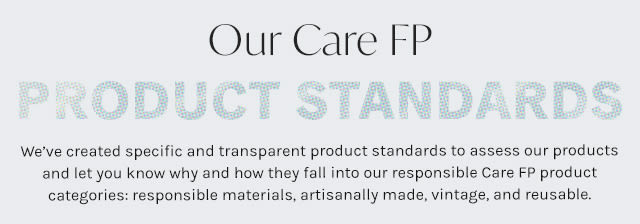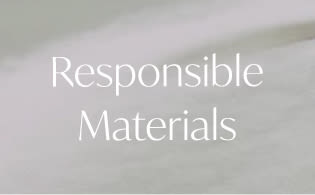
This category includes all products made with at least 50% of a certified material sourced with social or environmental impacts in mind, such as recycled, organic, and cellulose fibers. We carefully review all of our eco-conscious Care FP products one by one to ensure they reach this standards. Explore our most frequently used certifiable fibers below.
Sustainable Fibers From A-Z
Free People partners with Better Cotton Initiative (BCI)I to improve cotton farming globally. By choosing our cotton products you’re investing in BCI’s mission to help cotton communities survive and thrive, while protecting and restoring the environment.
Certified BirlaTM and TencelTM Modal are both created from the biodegradable plant-based material made from the pulp of beechwood trees, and require less resources to grow due the trees’ high fiber yield, which is double that of conventional cotton.
Made from wood pulp, Birla Viscose is not only biodegradable but it is the first viscose that adheres to the highest levels of safety and purity standards, offering maximum product quality with minimal environmental impact.
Our 100% eco-responsible Euroflax linen can be traced directly back to the farms where it’s harvested in France. For every 1 acre of euroflax linen harvested over 1.5 metric tons of C02 is absorbed every year.
Our recycled cotton gives new life to post-consumer cotton and carries the GRS (Global Recycled Standard) certificate and carries a lighter carbon footprint and utilizes less water than conventional cotton.
Repreve Recycled Nylon is made from 100% recycled materials, including post-consumer plastic bottles and pre-consumer waste, all fully certified and traceable.
Econyl is a recycled material made from regenerated nylon and is knit in a zerowaste process that yields zero cutting room floor waste or byproduct waste during production. Qnova is predominantly made from post-industrial nylon waste coming from its yarn’s production cycle.
Recycled polyamide uses waste materials that would otherwise end up in the landfill. Its raw material sources range from old fishing nets and carpets to also waste from the manufacturing industry.
Recycled polyester gives a second life to materials that aren’t biodegradable (plastic water bottles + containers) and would otherwise end up in a landfill or an ocean. We use both post-industrial and post-consumer input materials.
Regenerative cotton is harvested utilizing regenerative farming techniques which create a healthy relationship between cotton plants, the soil, and the Earth. These farming methods focus on soil health and biodiversity as well as carbon sequestration allowing for greater crop yields.
Tencel LyocellTM fibers are biodegradable as they are produced in a closed loop process which recovers water and 99.8% of the solvent, transforming wood pulp into fibers with high resource efficiency and low environmental impact.
USA Cotton Trust Protocol Cotton can be traced back to the domestic family farms where it is harvested, and follows a high level of FDA, USDA, and EPA regulations - including soil conservation, water management, and labor protections and carries a transaction certificate.
Made in partnership with independent brands and artisans, including 501(c)3 nonprofits and small businesses around the world. These products are thoughtfully crafted using hand touched and small batch artisanal production processes. To date we have supported over 320+ small and artisan businesses.
Previously loved items that support circularity, including vintage, secondhand and upcycled styles.
Everyday products to help you reduce your personal waste and carbon footprint by eliminating single use items.
Products that are manufactured with social and environmental processes and considerations within their supply chain, including BCI cotton.





